

Inspirational Video- Be a Mr. Jensen- MUST WATCH!! Christopher Emdin: Teach teachers how to create magic. Rita Pierson: Every kid needs a champion. Free Lesson Plans & Teacher Resources. Football Coach Resources. Special Education Sayings and Special Education Quotes. Below you will find our collection of inspirational, wise, and humorous old special education quotes, special education sayings, and special education proverbs, collected over the years from a variety of sources.
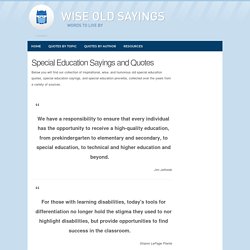
We have a responsibility to ensure that every individual has the opportunity to receive a high-quality education, from prekindergarten to elementary and secondary, to special education, to technical and higher education and beyond. Jim Jeffords For those with learning disabilities, today's tools for differentiation no longer hold the stigma they used to nor highlight disabilities, but provide opportunities to find success in the classroom. Sharon LePage Plante In special education, there's too much emphasis placed on the deficit and not enough on the strength.
Temple Grandin Nothing in this world can take the place of persistence. Calvin Coolidge The secret in education lies in respecting the student. Ralph Waldo Emerson Dianne Feinstein Ignacio Estrada Herbert Spencer Dr. Albert Einstein. Highly Successful Parent Teacher Communication. One of the most beneficial aspects of teaching is building positive relationships with parents.
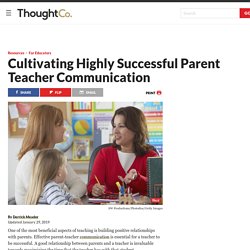
Effective parent-teacher communication is essential for a teacher to be successful. A good relationship between parents and a teacher is invaluable towards maximizing the time that the teacher has with that student. A student who knows that the teacher communicates on a regular basis with their parents and who knows that their parents trust the teacher will likely put more effort into school. Likewise, a student who knows that the teacher rarely or never communicates with their parents and/or their parents do not trust the teacher will often pit the two against each other. That is counterproductive and will create problems for the teacher and ultimately issues for the student as well.
Many teachers underestimate the value of building relationships with their students’ parents. Build Their Trust. 7 Practical Tips to Achieve a Positive Mindset. The “power of positive thinking” is a popular concept, and sometimes it can feel a little cliché.
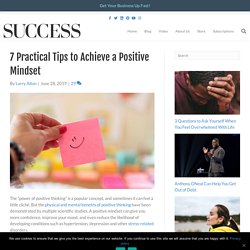
But the physical and mental benefits of positive thinking have been demonstrated by multiple scientific studies. A positive mindset can give you more confidence, improve your mood, and even reduce the likelihood of developing conditions such as hypertension, depression and other stress-related disorders. All this sounds great, but what does the “power of positive thinking” really mean? You can define positive thinking as positive imagery, positive self-talk or general optimism, but these are all still general, ambiguous concepts. If you want to be effective in thinking and being more positive, you’ll need concrete examples to help you through the process.
Integrating Mindfulness in Your Classroom Curriculum. Now more than ever, teaching mindfulness in the classroom is a necessity.
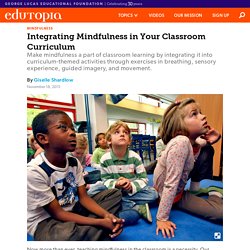
Our children are stressed and anxious. Teachers and parents are stressed and anxious, too. Our lives are busy, and we often find our thoughts buzzing over the past or worrying about the future. We need mindfulness because it teaches us to live in the present moment, enjoying and experiencing what’s in front of us. Educators know that children learn best when they are comfortable, safe, and relaxed. IRIS. Embracing the Whole Child. Four Suggestions In embracing a more whole-child, humanizing approach to teaching and learning, Salazar proposes specific ways educators can express care and engage students in a more humanizing pedagogy.
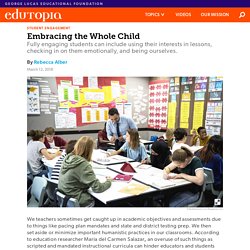
Among her suggestions, I’d like to explore the following four, offering suggestions for each, as I have found them particularly useful to establishing a harmonious community of learners in the classroom. 1. Football Clinics - Glazier Football Coaching Clinics. Special Education Resources and Links for Parents and Teachers. National Association of Special Education Teachers: Resources for Special Education Teachers. Using Empathy to Teach Social-Emotional Skills. Teaching Learners with Multiple Special Needs. Special Needs Lesson Plans. General Education and Special Education. How can you build a strong and mutually beneficial relationship with special and general education colleagues using a collaborative teaching approach?
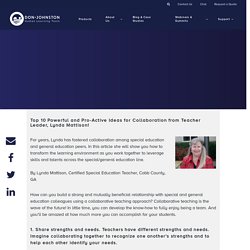
Collaborative teaching is the wave of the future! In little time, you can develop the know-how to fully enjoy being a team. And you’ll be amazed at how much more you can accomplish for your students. 1. Share strengths and needs. General Ed teachers may not be familiar with all of the specialized resources Special Ed teachers know about for matching practice with a student’s skill level which may be far below the grade level.Special Ed teachers may not be familiar with the rich activities and projects often used to apply learning on grade level.Both teachers may know some techniques to face disciplinary problems.
While general educators are well trained to use and teach students on many types of software, the special educator brings a working knowledge of a versatile realm known as assistive technology. 2. 3. 4. 5. Page 16: Lesson Plan Design. Page 16: Lesson Plan Design The daily lesson plan is the most detailed standards-based plan that a teacher will develop.
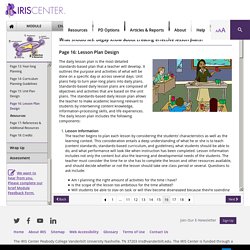
It outlines the purpose and activities of what will be done on a specific day or across several days. Unit plans help to turn year-long plans into daily plans. Standards-based daily lesson plans are composed of objectives and activities that are based on the unit plans. The standards-based daily lesson plan allows the teacher to make academic learning relevant to students by intertwining content knowledge, information-processing skills, and life experiences. Lesson Information The teacher begins to plan each lesson by considering the students’ characteristics as well as the learning context. Veronica NolanKindergarten TeacherAlbuquerque Public SchoolsNew Mexico.
Wrightslaw Special Education Law and Advocacy. Inclusive education, Inclusion classroom, Diversity quotes. Response to Intervention. Do2Learn: Educational Resources for Special Needs. Teacher to Teacher Ideas in the Top Teaching Blog. Popular Special Education Books.